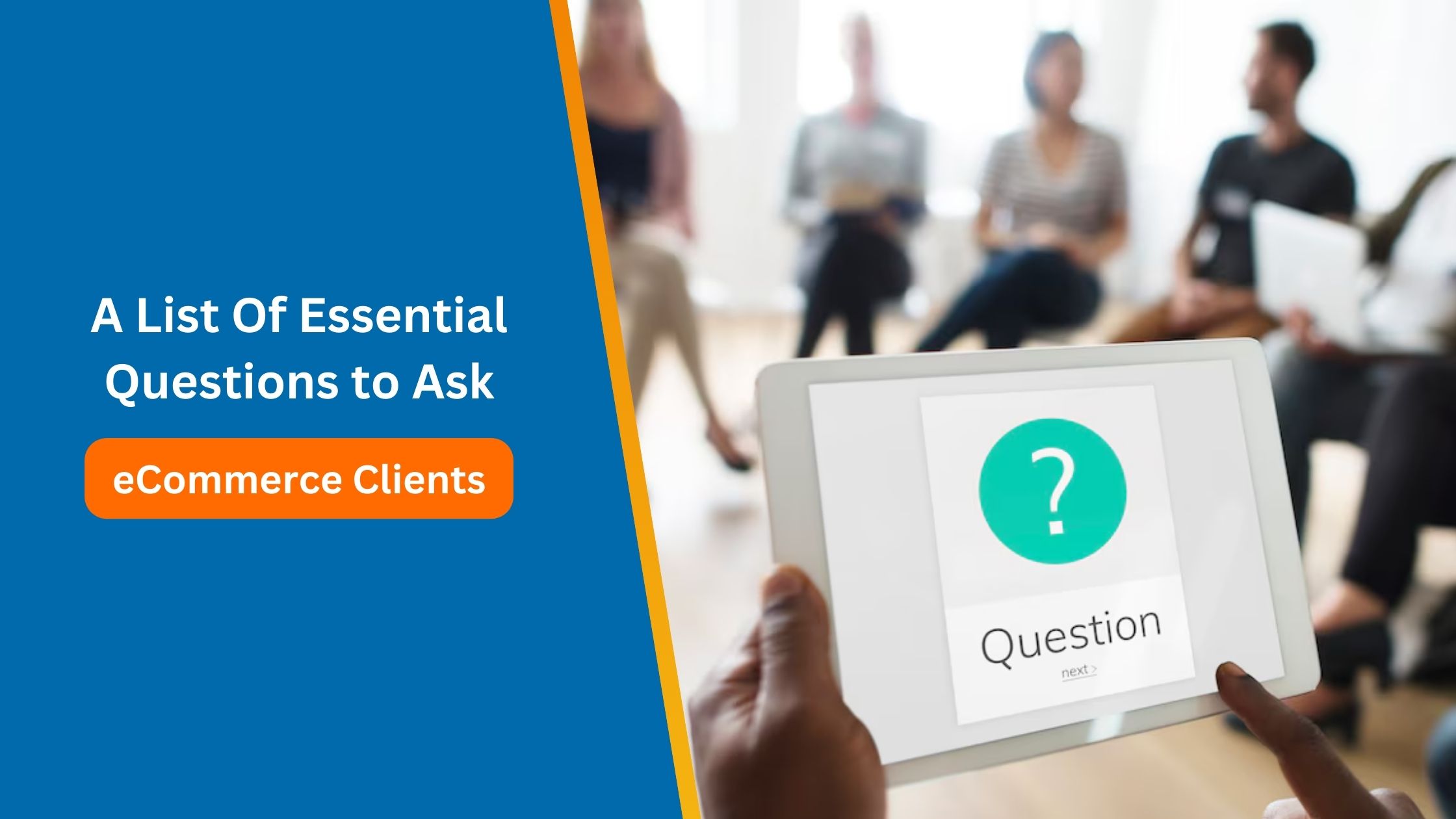Still reading “Tips to Grow Your Ecommerce Business” articles online? Online shopping is no more a new thing in this digital era. With an estimated 2.77 billion shoppers by 2025, eCommerce companies face increasing pressure to digitize their products and services. Everybody knows HOW, but does not know WHAT it needs to be online.
For any eCommerce development company, it’s vital to collaborate with your customers to pull off e-commerce projects that mutually benefit your client and you. This collaborative approach ensures that both parties are actively involved in the project, leading to a more successful outcome.
Asking the right questions is the key to unlocking insights that can shape your project’s success. Your client’s input, their business objectives, their target audience, and their technical preferences are all crucial elements that can make a difference in your project’s outcome. Understanding and valuing their unique perspective is the cornerstone of effective project planning.
Right Questions to Ask Your eCommerce Clients
This blog will delve into the inquiries you should pose to eCommerce clients. We’ll touch on aspects like understanding their business, needs, marketing strategies, budget constraints, and post-launch assistance for project planning and implementation.

See How Our Experts Can Drive More Traffic to Your Website!
SEO: Boost your rankings and drive more organic traffic today!
Website Design/Development: Create a stunning website that converts visitors into customers.
Paid Media: Reach the right audience at the right time with expertly managed paid media.
Section 1: Getting to Know the Client Business
1. What are the objectives and goals of your business?
Understanding the business objectives and goals of the client is crucial for aligning the project with their overall vision. Are they focused on boosting sales, expanding their market presence, or enhancing customer loyalty? Having clarity on these objectives aids in crafting a customized solution that caters to their requirements.
2. Who is your target audience?
Identifying the target audience is essential for devising strategies that resonate with customers. Questions like: What are your customers’ characteristics? What are their shopping behaviors and preferences? Understanding the target audience ensures that solutions are tailored to attract and engage with individuals.
3. What products or services do you offer?
It’s important to grasp the client’s core offerings to provide solutions. Which products or services are significant for their business? Are there any features or selling points? This understanding helps emphasize aspects of the business and develop content highlighting these offerings.
4. Who are your primary competitors?
Examining the client’s competitors offers insights into the market landscape and aids in formulating plans. Inquire about who your rivals are, what tactics they utilize, and what sets your business apart from theirs. This data can help distinguish your client’s business in the market.
Other Points to Ponder:
- What obstacles do you face in your business at present?
- What are your immediate and future business strategies?
- How do you gauge success and performance currently?
- What is the purpose and outlook of your brand?
- Are there any partnerships or collaborations that impact your business already established?
Section 2: Design Preferences
5. Which platform are you currently utilizing (if any)?
Knowing the client’s platform is important to ensure a transition or integration. Are they using Shopify, Magento, WooCommerce or a built solution? Understanding their existing setup is key for planning migrations, integrations, or enhancements
6. Do you have any design preferences or brand guidelines?
Design preferences and brand guidelines play a role in maintaining brand consistency and improving user experience. Inquire about color schemes, typography choices, and overall design aesthetics. For example, understanding their design preferences is essential if your client aspires to have the best jewelry website design. Aligning these elements with the client’s brand identity will make the product to their target audience.
7. What features and functionalities are you looking for?
Identifying the features and functionalities is crucial for meeting the client’s requirements. Common features may include payment gateways, search options, product filters, and customer reviews. Ask about needs such as language support, inventory management, or subscription services to ensure all essential functionalities are addressed.
8. Do you need any custom integrations?
Custom integrations are often required to ensure operation and enhanced functionality.
When reaching out to the client, it’s important to ask about any systems they use, like CRM, ERP, or marketing automation tools. This information is crucial for planning and carrying out integrations that align with the client’s business operations.
Here are some additional points to consider:
- What are your requirements in terms of hosting and security?
- Are there needs for SEO or optimizing performance?
- How do you intend to manage data migration (if applicable)?
- Do you have any obligations related to accessibility or compliance that must be met?
- What level of customization are you looking for regarding user interface and overall experience?
Section 3: Marketing and SEO Strategies
9. What marketing tactics are you currently using?
Knowing the client’s existing marketing approaches is crucial to develop a plan. Are they focusing on media, email campaigns, content creation, or paid promotions? Aligning with these strategies ensures that the new project complements and boosts their marketing efforts.
10. Do you have a search engine optimization (SEO) plan in place?
A well-thought-out SEO strategy should be incorporated from the start of the project. Inquire about the client’s SEO methods, target keywords, and overall objectives. Discussing these aspects helps construct a search engine-optimized website that enhances visibility and attracts traffic.
11. What metrics do you use as performance indicators (KPIs)?
Defining KPIs is crucial for evaluating project success. Which metrics matter most to the client? Common KPIs include website visits, conversion rates, average order value, and customer loyalty rates. Understanding these measures aids in establishing targets and monitoring progress effectively.
Other Questions to Ask Related to Marketing and SEO Strategies:
- Which channels do you primarily use for acquiring customers?
- How do you Monitor your marketing campaigns presently?
- Is there a content marketing plan in place?
- Which social media platforms are you focused on?
- Do you utilize any tools or software for your marketing and SEO needs?
- How much are you planning to allocate for marketing and SEO initiatives?
- Are there any partnerships or collaborations that impact how you approach marketing?
- How frequently do you refresh your content and focus on SEO optimization?
- What obstacles are you facing in your marketing and SEO endeavors?
- Have you scheduled any promotional campaigns?
Section 4: Budget and Schedule
12. What is the budget you have allocated for this project?
Understanding the client’s budget is crucial for setting expectations and planning accordingly. Discussing the budget helps determine which features and services can be feasibly provided. It’s important to match the project scope with the budget to prevent any misunderstandings and ensure a result.
13. What timeframe are you aiming for to complete this project?
The project’s completion timeline plays a role in planning and execution. Inquire about the client’s expected timeline and any specific deadlines they have in mind. Emphasize the importance of sticking to the schedule to meet launch dates, marketing plans, and other crucial milestones.
14. Are there any deadlines or milestones that we should be aware of?
Identifying deadlines and milestones is essential for keeping the project on course. Are there dates set for product launches, marketing initiatives, or events? Meeting these deadlines is crucial for the client’s business strategy and can impact their success. Incorporating these into our project plan ensures delivery and client satisfaction.
Other Considerations For Questions Related to Budget & Timeline:
- Are there any phases or stages within the project that require budgets or timelines?
- How flexible are you, with adjusting both timeline and budget for this project?
- Are there any dependencies or external factors that might influence our timeline?
- What’s the best way for you to keep us updated on the project?
- Do you have any preferences regarding managing and reporting on the project?
- How do you decide what’s most important in the project, like design, functionality, or marketing?
- Do you anticipate any risks or obstacles in sticking to the budget and schedule?
- What do you plan to do if we exceed the budget or face delays in the timeline?
- How do you measure if a project is successful based on budget and timeline?
- Are there any activities we need to know about after the launch or future projects?
Section 5: Support and Maintenance After Launch
15. What support do you need after launching your website?
It is important to discuss the support needed after the website goes live to ensure everything runs smoothly. Find out from the client what kind of support they expect, like fixing bugs, making updates, and general maintenance. This ongoing support is key to keeping the website working and providing a user experience.
16. Are there any training needs for your team?
Offering training to the client’s team can help them manage the website independently. Check if they require training on managing content, updating products, or using features. This training is helpful for running the site and reducing dependence on assistance.
17. What are your strategies for updates and growth?
It’s crucial to plan for updates and growth to ensure the eCommerce site stays successful in the long run. Ask about the client’s plans for growth, such as adding products, expanding into markets, or incorporating more features. Knowing these plans will help create a solution that can adapt to requirements.
Other Support and Post-Launch Questions:
- How frequently do you expect to need updates or new features?
- Do you have a way to report and address issues after the website goes live?
- Do you use any tools or platforms for maintaining the site?
- What response and resolution times do you expect for support requests?
- Have you set aside a budget for launch support and maintenance?
- Are there any compliance or security regulations to consider for maintenance?
- How do you intend to manage customer feedback and make enhancements?
- What are your performance and uptime expectations for the website?
- Are there any updates or changes that need scheduling?
- How will you evaluate the success of launch support and maintenance activities?
- Would engaging with an ecommerce SEO consultant on a regular basis be beneficial for your website’s optimization and competitiveness?
Enough Questions!
The key to success is asking questions and communicating with your eCommerce client. This approach unlocks a treasure trove of information that shapes the trajectory of your project. By grasping their business objectives, target audience, and technical requirements, you can design an eCommerce solution that aligns perfectly with their growth aspirations.
Effective collaboration and transparent communication serve as the foundation for a partnership. Through collaboration with your client, you can ensure that the project reflects their vision and delivers outcomes.
Are you prepared to unleash the potential of your eCommerce endeavor? Contact Icecube Digital today for a consultation. Let us explore how we can elevate your client’s business in the digital realm.

























